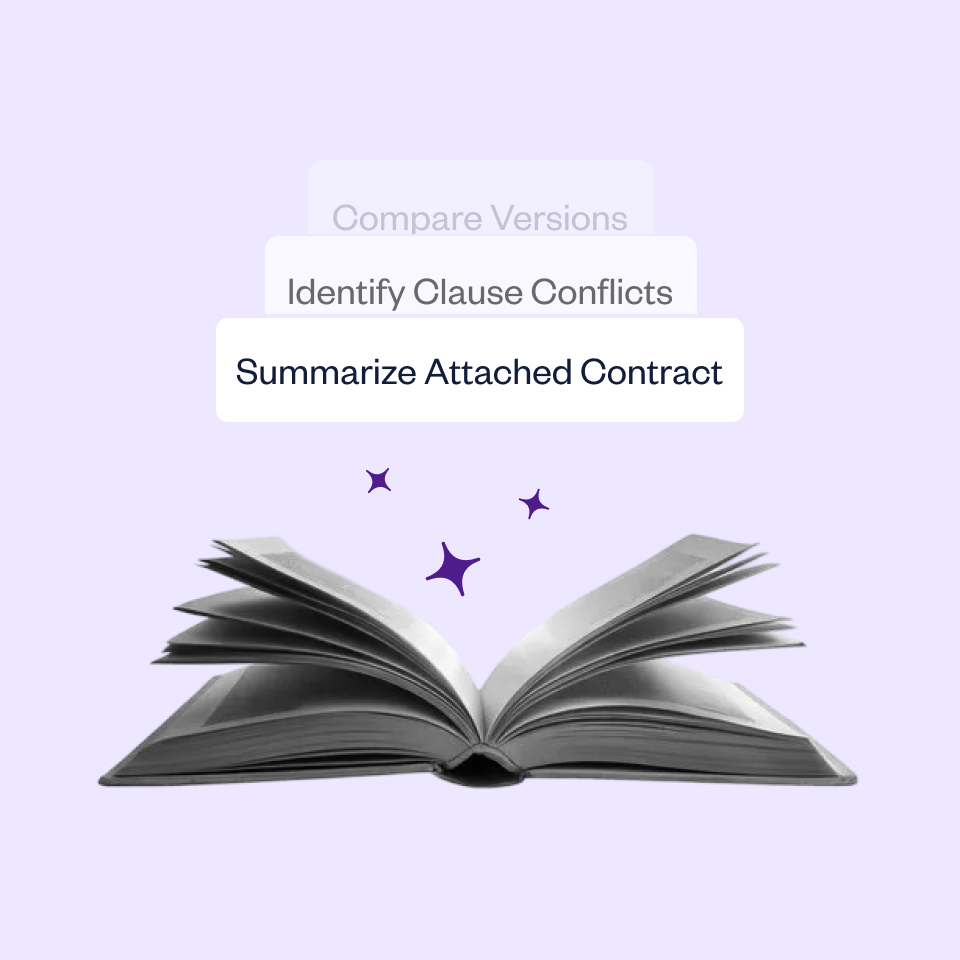Your clients will require different types of healthcare contracts when they expand their networks of physicians, payers, vendors, and technology providers. Properly structured legal agreements are essential for medical facilities to maintain compliance and operational efficiency.
According to the HIPAA Journal, poorly drafted agreements are one of the key reasons that led to compliance failures and million-dollar fines in 2024 for many service healthcare providers, such as Sentara Hospitals ($2,175,000), Athens Orthopedic Clinic PA ($1,500,000), Lifespan Health System Affiliated Covered Entity ($1,040,000), and MedEvolve Inc. ($350,000). These penalties serve as a stark reminder that contracted services in the healthcare industry require carefully created agreements to avoid financial repercussions.
In this article, we’ll explore all those major healthcare agreements to help your clients minimize risk and strengthen partnerships.
TL;DR
- Properly structured agreements help maintain compliance with healthcare regulations like Stark Law, HIPAA, and the Anti-Kickback Statute.
- Key healthcare contract types include physician employment, medical directorship, supply chain, equipment lease, pharmacy, managed services, professional service, patient transfer, managed care, and IT/technology licensing contracts.
- Best practices include using clear language, defining payment terms and termination provisions, and ensuring regulatory compliance.
- Using healthcare contract management software helps manage healthcare contracts smoothly, maintain operational efficiency, and respond more quickly to regulatory changes.
What are healthcare contracts?
A healthcare contract defines services between a healthcare facility and its partners, employees, vendors, and patients. Generally, these legally binding agreements cover the details of how the association works, the responsibilities of each party, compensation, and governing laws.
Healthcare contract template
Whether you’re drafting a contract for an equipment lease, consultations, pharmacy services, or IT services, your healthcare agreements must cover all the essential clauses to ensure compliance with industry standards. Key elements of healthcare agreements include:
- Parties involved: Names, contact details, and roles of the provider and patient/client.
- Scope of services: Description of medical services, treatments, or care to be provided.
- Payment terms: Fees, payment schedules, insurance details, and penalties for late payments.
- Confidentiality: Compliance with privacy laws, such as HIPAA.
- Term and termination: Duration of the contract, conditions for ending the agreement, notice requirements, and governing laws.
- Liability limitations: Clarification of the provider’s responsibilities and malpractice insurance.
- Dispute resolution: Process for resolving disagreements, like mediation and arbitration.
- Signatures: Legal acknowledgment by both parties.
Here’s a sample of a healthcare contract.
(Healthcare Provider Name)
Address
Contact: (Phone/Email)
License Number: (If applicable)
(Client Name)
Address:
Contact: (Phone/Email)
1. Scope of Services
The Provider agrees to deliver the following services: _____.
2. Payment Terms
- Fees: (Total cost or hourly rate).
- Payment Due: (Schedule, e.g., “Monthly” or “Per-session”).
- Insurance: (Details of coverage, if applicable).
- Late Payments: (Penalty fees, if any).
3. Confidentiality
All patient information will be kept confidential per XYZ Law.
4. Term and Termination
- Effective Date: (Start Date).
- Termination: Either party may terminate this agreement with (X days) written notice.
5. Liability
The Provider is not liable for ____ (specify exclusions).
6. Dispute Resolution
Disputes will be resolved through (Mediation/Arbitration) in (Jurisdiction/State).
7. Governing Law
This contract is governed by the laws of (State/Country).
Signatures
(Provider Name) | Date: _________
(Patient/Client Name) | Date: _________
Need to quickly create a clear, legally binding, specific agreement for your clients? Download our ready-to-use healthcare contract template that you can customize based on your client’s requirements.
Types of healthcare contracts
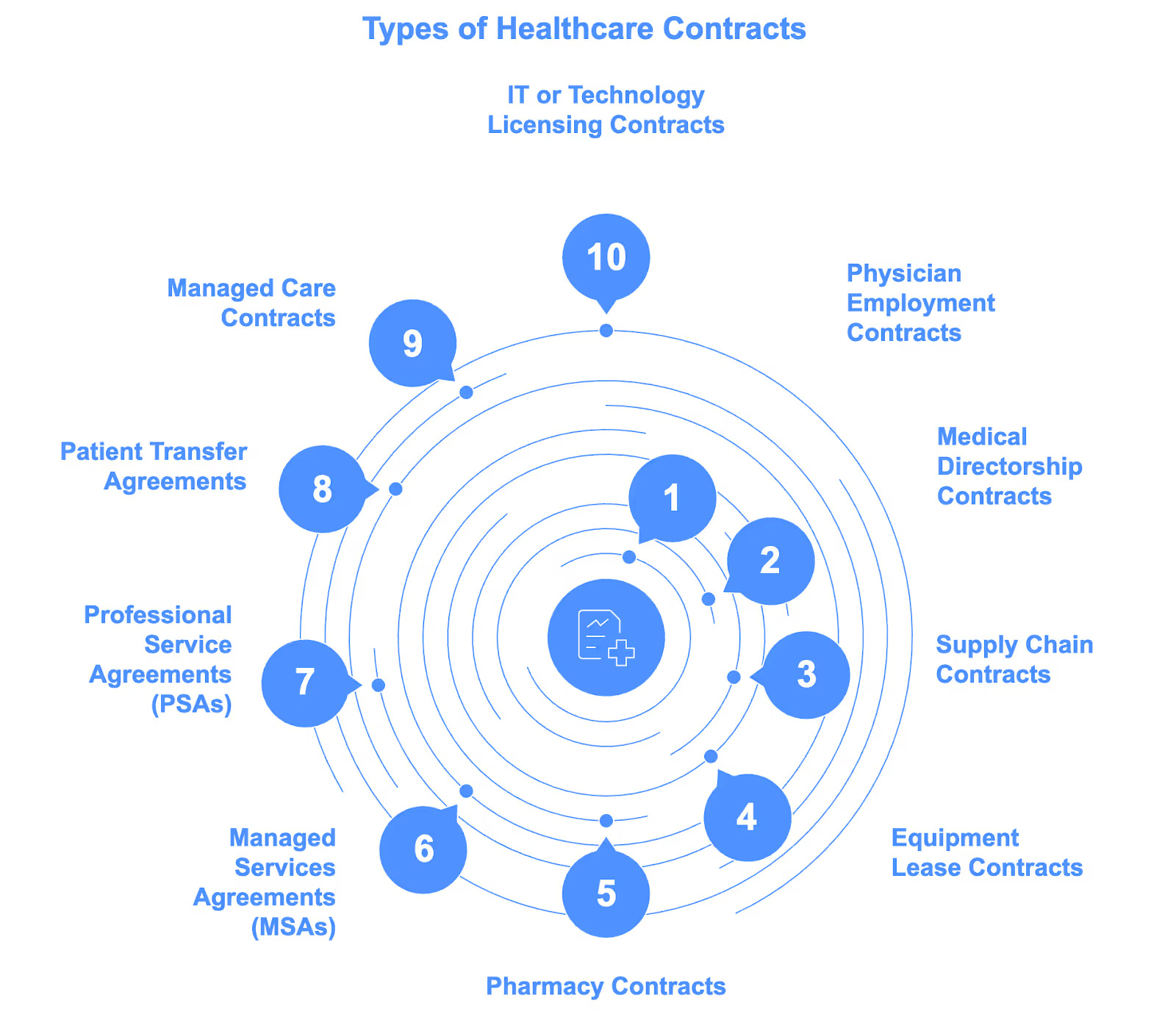
Whether you're representing physicians, hospitals, or vendors, understanding various types of healthcare contracts will strengthen your legal counsel.
Physician employment contracts
This contract type helps define a physician’s professional relationship with the healthcare facility. While drafting a physician employment contract, you must include timeline expectations, on-call requirements, compensation, benefits, restrictive covenants, and termination terms.
Medical directorship contracts
Directors are a critical part of medical facilities that oversee policy development and best practices implementation. Thus, a medical directorship agreement is necessary to outline their responsibilities and comply with Anti-Kickback Statute requirements. This contract must also cover elements like compensation, termination process, non-compete, and non-solicitation clauses.
Supply chain contracts
Healthcare organizations need supply chain arrangements when they collaborate with independent vendors to procure various supplies, goods, and services for a pre-determined period at a fixed cost. It can be medical supplies, legal consultation, cleaning services, or marketing initiatives. A well-defined contract ensures the supplier will follow the delivery schedules.
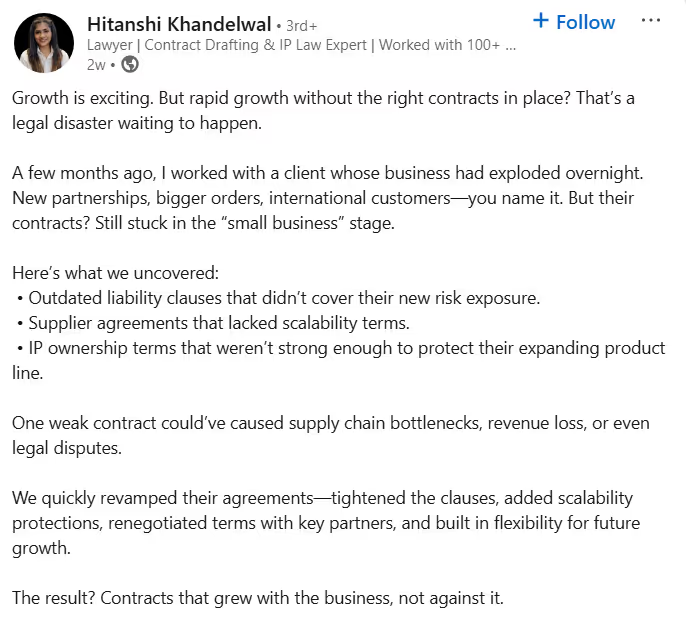
Source: Hitanshi Khandelwal via LinkedIn
Based on the medical facility’s requirements, you can choose from two types of supply chain contracts with vendors, i.e., purchase orders and service agreements. A purchase order contract governs what a healthcare facility wants to buy from a vendor whereas a service agreement details the list of services a vendor will offer to a healthcare organization.
All supply chain agreements usually cover pricing terms, the responsibilities of parties involved, and termination clauses.
Equipment lease contracts
Leasing specialized equipment temporarily is common in medical facilities to avoid the expenses of upfront purchases without compromising healthcare services.
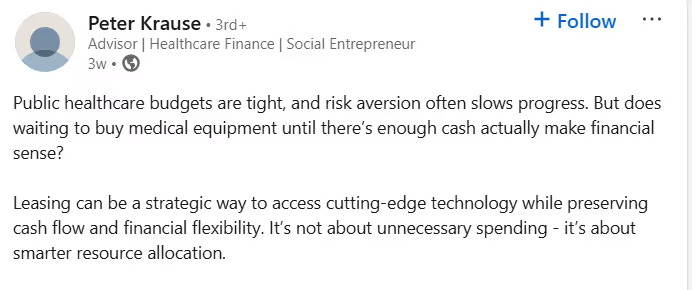
Source: Peter Krause via LinkedIn
So whenever healthcare organizations rent equipment, they create a leasing contract that outlines usage, duration, payment conditions, upgrade provisions, renewal terms, and maintenance responsibilities.
Pharmacy contracts
A legal agreement between healthcare facilities and pharmacies not only protects each party’s rights but also helps comply with state and federal regulations. However, the terms and conditions for each pharmacy contract differ based on the services provided by the vendor or manufacturer.
You’ll draft manufacturer or vendor rebate agreements to outline what conditions a medical facility must meet to get a discount on future purchases. On the other hand, group purchasing agreements allow special healthcare facilities to negotiate and get discounted prices from vendors.
Managed services agreements (MSAs)
For smooth functioning and providing quality care, hospitals outsource various non-medical services like facility maintenance, administration tasks, bill collections, transcription services, and equipment management.
These collaborations require a managed or purchased service agreement, which specifies the scope of services, quality standards, payment structures, timelines, compliance requirements, and exit strategies between third-party vendors and healthcare providers.
Professional service agreements (PSAs)
PSA is a type of consulting agreement that sets business boundaries between a healthcare facility and an independent contractor on a one-off project. You can create this contract when hospitals take assistance from outside contractors like specialized physicians and HVAC service providers. In this contract, you’ll cover details about the scope of services, pay rates, payment timelines, confidentiality clauses, and contract termination.
Patient transfer agreements
If a hospital shifts a patient to another facility, they must draft a well-defined transfer agreement. It’s a formal document ensuring the continuity of patient treatment and care. This lawfully valid contract includes clear protocols, liability considerations, duration of care, billing procedures, insurance information, and contract termination.
Managed care contracts
This legal agreement is signed between healthcare facilities and insurance firms to ensure patient safety and control healthcare costs. A well-structured managed contract is vital to avoid non-compliance with billing procedures and policy provisions.
The formal document clearly outlines the quality standards expected from the provider, the timeline to submit a claim, patient coverage, the reimbursement schedule, billing protocols, and termination provisions.
IT or Technology Licensing contracts
Like any other business, technology is also part of today’s healthcare organizations. Thus, tech contracts are vital to protect all involved parties. Usually, the technology owners are responsible for drafting the licensing agreements.
These agreements specify clear implementation, usage, duration, licensing fees, prohibited activities, liability clauses, and payment terms. However, the overall contract details will depend on the services procured by the medical facility.
For example, an IT agreement comes into play when a medical facility partners with a third-party vendor for services like infrastructure management, application development and maintenance, and data center services. When a vendor operates and manages the software on behalf of a hospital, the parties can sign an application service provider agreement. Meanwhile, healthcare providers will need a software licensing contract if they collaborate with a technology business to use a specific software.
Best practices for managing healthcare contracts
Every healthcare contract needs to be thorough so that the medical facility’s services meet safety and quality standards. Here are the key rules to create, organize, and monitor medical-related contracts efficiently.
Use clear and simple language
While creating healthcare agreements, you must use easy-to-understand language to keep misunderstandings and ambiguity out of the picture. Avoid using jargon that could lead to varying interpretations of certain clauses. Instead, aim to provide maximum clarity when you specify technical terms and complex clauses.
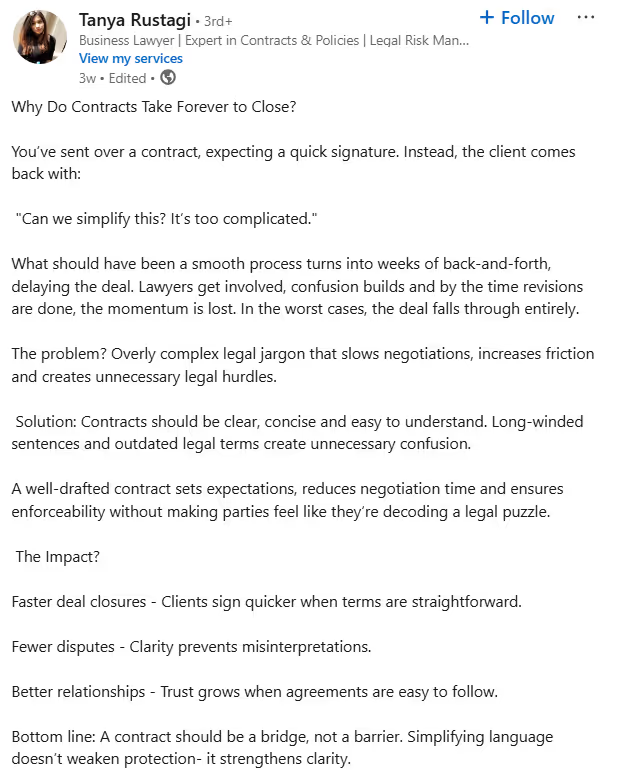
Source: Tanya Rustagi via Linkedin
Define payment terms, contract renewal, and termination provisions
Clear payment terms are essential to maintain financial stability and cash flow in healthcare organizations. So, include the reimbursement rates, payment cycle, and any penalties for late payments in all your healthcare agreements.
Further, don’t forget to clearly define contract renewal conditions, termination terms, notice periods, and conflict resolution procedures so that all parties are prepared for the next steps.
“Like the start date of the contract, being crystal clear on when the contract ends can save you a lot of heartaches. Spend the necessary amount of time thinking about all of the reasons you’d want to the agreement to terminate and make sure those are included.”
~ Sterling Miller, CEO and Senior Counsel, Hilgers Graben PLLC
Ten Things: I Know It’s Only Boilerplate (But I Like It)!
A well-defined contract not only ensures on-time payment clearance but also helps avoid billing disputes in the future.
Also Read: Finding Common Ground: How to Resolve Contract Disputes
Ensure compliance with legal and regulatory requirements
Healthcare facilities must ensure that contract terms and conditions align with regulatory expectations and data privacy laws of their jurisdiction, like the Stark Law, HIPAA, and the Anti-Kickback Statute. According to the Office for Civil Rights (OCR), the healthcare industry had a 239% increase in security breaches between 2018 and 2023. Thus, always specify how the involved parties will manage sensitive patient data to avoid regulatory violations and legal fines.
“The thing about privacy is identifying what data is involved, how we are sharing it, and how we are going to be compliant in that sharing.”
~ Ken Priore, ex-Director of Privacy, Atlassian
Mastering the Intersection of Law, Technology, and Privacy
Regular audits are also essential to identify potential issues early on so that your healthcare agreements stay legally compliant and beneficial as per the latest medical regulations and the hospital’s evolving needs.
Also Read: Deconstructing exceptional GCs, rolling with the punches, & paying it forward with Ani Bhat
Store all your contracts in a centralized repository
Be sure to store and organize all your healthcare agreements in a single place using a cloud-based Contract Lifecycle Management (CLM) system. If not, managing multiple contracts with employees, physicians, vendors, and insurers will become a daunting task.
With SpotDraft’s CLM software, you can save these legal documents in a secure cloud location to access any file in a few minutes. Moreover, you can quickly track the status, renewals, and compliance requirements to avoid financial losses. To eliminate the risk of data breaches, you can also restrict access to only authorized staff, healthcare professionals, and vendors with the healthcare contract management system.
Also Watch: Thriving Through Change Podcast with Ron Bell, Collective Health CLO and Former Yahoo! GC
Build Strong Partnerships with Healthcare Contracts
Contracts are more than just paperwork in the healthcare business. From physician employment to technology licensing, each contract type aims to protect all parties involved in the healthcare business.
When done right, these contractual agreements make it crystal clear who does what, when to initiate payments, and how to handle problems. This clarity helps medical facilities focus on what really matters - taking care of patients.
For smooth healthcare operations, use SpotDraft healthcare CLM so nothing falls through the cracks.


.avif)



